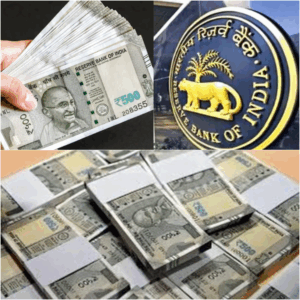“The Truth Behind the ₹500 Note Ban Rumors: What the Government and RBI Have to Say”
In recent days, social media has been abuzz with rumors about the ₹500 note being discontinued. The speculation gained traction after reports surfaced claiming that the Reserve Bank of India (RBI) had instructed banks to increase the circulation of ₹100 and ₹200 notes in ATMs. This led to widespread assumptions that the ₹500 note might soon be withdrawn from circulation. Adding fuel to the fire, a YouTube video by a channel called Capital TV claimed that the ₹500 note would be phased out by 2026.
These rumors created a wave of panic and confusion among the public, prompting the government to step in and clarify the situation. In this article, we delve into the origins of these rumors, the government’s official response, and the facts surrounding the ₹500 note.
.
.
.

The Rumors Begin
It all started with a directive issued by the RBI to banks, instructing them to increase the availability of ₹100 and ₹200 notes in ATMs. While this was a routine operational decision aimed at ensuring a balanced supply of smaller denomination notes, it was misinterpreted by some as a precursor to the withdrawal of ₹500 notes.
The situation escalated when Capital TV, a YouTube channel, published a video claiming that the government had plans to discontinue ₹500 notes by March 2026. The video suggested that the RBI was quietly preparing for the withdrawal of the ₹500 note and that the recent directive to banks was part of this plan. The video quickly went viral, spreading fear and uncertainty among people who began to believe that the ₹500 note might soon become invalid.
The Government’s Response
As the rumors gained momentum, the Press Information Bureau (PIB), the government’s official fact-checking unit, stepped in to debunk the claims. PIB issued a statement on its official social media handles, categorically denying the rumors.
In its tweet, PIB stated, “A YouTube channel named Capital TV has falsely claimed that ₹500 notes will be discontinued by March 2026. This claim is completely baseless. The RBI has made no such announcement, and ₹500 notes will continue to remain in circulation.”
The government urged people not to believe or share such false information and emphasized the importance of verifying news from official sources before spreading it further.
The Facts About ₹500 Notes
According to the RBI, there is no plan to withdraw ₹500 notes from circulation. The directive to banks to increase the supply of ₹100 and ₹200 notes was a standard measure to ensure that smaller denominations are readily available for transactions. It does not indicate any intention to phase out ₹500 notes.
Additionally, the RBI has not issued any notification or circular suggesting that ₹500 notes will be discontinued. The ₹500 note, introduced after the demonetization of 2016, remains a valid and legal tender in India.
The Role of Social Media in Spreading Misinformation
Social media platforms have often been a breeding ground for rumors and misinformation, and the case of the ₹500 note is no exception. Videos like the one published by Capital TV often rely on sensational claims to attract views and engagement, without any factual basis. Unfortunately, such content can create unnecessary panic among the public, especially when it concerns something as critical as currency.
The government has repeatedly advised citizens to rely on official sources for accurate information. Agencies like PIB and the RBI regularly issue updates and clarifications to dispel rumors and provide factual information.
The Political Angle
The controversy around ₹500 notes was further fueled by a statement from Andhra Pradesh’s former Chief Minister, Chandrababu Naidu. Naidu suggested that the central government should consider discontinuing ₹500 and higher denomination notes to tackle corruption. According to him, large denomination notes are a major contributor to black money and corruption, and their removal could help curb these issues.
While Naidu’s statement was a personal opinion and not an official policy recommendation, it added to the speculation surrounding the future of ₹500 notes. However, the government has not indicated any plans to act on Naidu’s suggestion.
Why the Rumors Spread So Quickly
The rumors about the ₹500 note gained traction for several reasons:
-
Public Memory of Demonetization: The demonetization of ₹500 and ₹1,000 notes in 2016 is still fresh in people’s minds. The sudden withdrawal of these notes caused significant disruption, and many fear a repeat of that scenario.
Misinterpretation of RBI’s Directive: The RBI’s routine directive to banks about increasing the circulation of smaller denomination notes was misinterpreted as a sign of an impending withdrawal of ₹500 notes.
Sensational Content on Social Media: Videos and posts making bold claims about the ₹500 note spread rapidly on platforms like YouTube and WhatsApp, where misinformation often goes unchecked.
Lack of Verification: Many people shared the rumors without verifying them, contributing to their spread.
The Importance of Fact-Checking
The incident highlights the critical need for fact-checking in today’s digital age. With the rise of social media, misinformation can spread like wildfire, causing unnecessary panic and confusion. Government agencies like PIB play a vital role in countering such misinformation and providing accurate information to the public.
PIB’s fact-checking initiative has been instrumental in debunking false claims and ensuring that people have access to reliable information. In the case of the ₹500 note, PIB’s timely intervention helped put an end to the rumors and reassured the public that their currency remains safe.
Lessons Learned
The controversy surrounding the ₹500 note serves as a reminder of the importance of responsible communication, both by individuals and the media. Here are some key takeaways:
-
Verify Before Sharing: Always verify information from official sources before sharing it on social media. Spreading unverified news can cause panic and harm.
Rely on Trusted Sources: For news related to government policies and announcements, rely on trusted sources like PIB, RBI, and reputable news outlets.
Be Cautious of Sensational Claims: Content that makes bold or sensational claims is often designed to attract attention rather than provide accurate information. Approach such content with skepticism\
Play video:
Conclusion
The rumors about the ₹500 note being discontinued were nothing more than baseless speculation fueled by misinformation on social media. The government and RBI have made it clear that there are no plans to withdraw ₹500 notes, and they will continue to remain in circulation.
As citizens, it is our responsibility to stay informed and avoid spreading false information. By relying on official sources and fact-checking claims before sharing them, we can help prevent the spread of misinformation and ensure that accurate information reaches everyone.
For now, the ₹500 note remains a valid and essential part of India’s currency system, and there is no need for concern. Let this serve as a reminder to always seek the truth and not fall prey to rumors.
News
Missing PG Student Monica from Darbhanga CM College Found in Shocking Condition—Police Stunned
Missing Darbhanga CM College Student Monica Found Safe—Reveals She Left Home Willingly to Marry A week-long mystery surrounding the disappearance…
Chaos on the Kanwar Yatra: Devotees Go on Rampage, Vandalize Dhaba from Muzaffarnagar to Roorkee!
Kanwar Yatra Turns Violent: Kanwariyas Vandalize Dhabas from Muzaffarnagar to Roorkee Over Onion in Food A shocking wave of violence…
Uproar After Samajwadi Party Leader Sunil Yadav’s Death: Ex-MLA and Brother-in-Law Named in FIR!
Uproar in Sultanpur After Samajwadi Party Leader Sunil Yadav’s Mysterious Death: Former MLA and Brother-in-Law Named in FIR A wave…
Shocking Viral Video: Teacher Beats Student with Stick in Bihar School—Discipline or Violence?
Bihar School Turns Battleground: Viral Video Shows Teacher Beaten Brutally by Angry Parents—Discipline or Violence? A shocking video has taken…
Forced to Strip at Knifepoint: Obscenity in the Name of Jobs—What’s Happening in Uttar Pradesh?
Job Promise Turns Nightmare: Woman Forced to Undress at Knifepoint in Uttar Pradesh Official’s Quarters Uttar Pradesh: A shocking video…
UP Education Minister Injured in Road Accident as Convoy Cars Collide
UP Education Minister Gulab Devi Injured in Road Accident as Convoy Cars Collide Hapur, Uttar Pradesh: Uttar Pradesh’s Education Minister,…
End of content
No more pages to load












